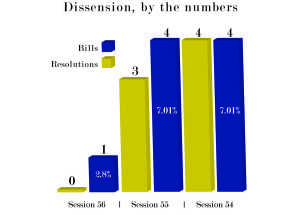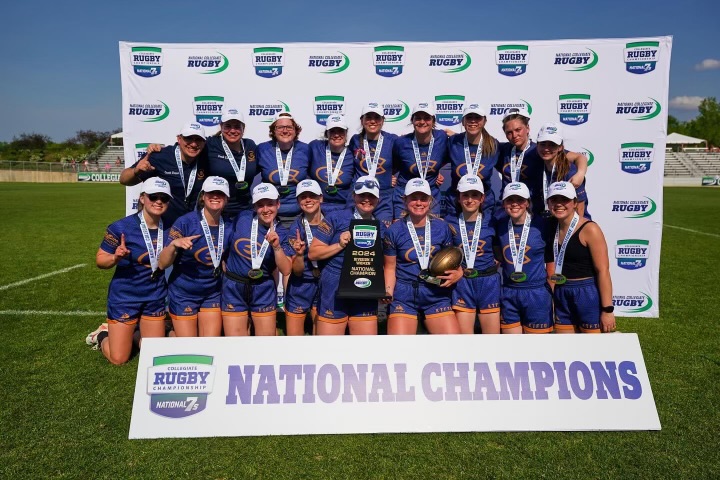There are concerns held by several current and former student senators as well as some students about the way things are being run in the 56th Senate session. The concerns started last fall, but have been building until recent events caused some to publicly vocalize them.
The recent resignation of former Student Services Commission Director Brianna Burke roughly marks the beginning of the outing of these concerns.
“If you look at the Senate and see how it’s constructed right now, it looks specifically oriented,” Burke said, and said it is entirely possible that there is a certain agenda being pursued.
This agenda that is troubling Burke was the reason sophomore and former senator Elizabeth Richter resigned from her position in the fall. Richter and others claim this issue is something the student body should be concerned about.
Members of the Senate’s executive board, the body which is receiving most of this criticism, claim their “agenda” is not new to anything previous Senates have done.
They also point to increases in Senate efficiency and productivity as an improvement to past Senate sessions, also stressing they are always open to concerns by other senators and students alike.
Describing the agenda
When piecing together all of the components being described by concerned senators and students, there seems to be several distinct parts to the agenda based on similarities in the complaints.
Senator Burke and former Senators Frank Heaton and Richter all said there is a more conservative approach to the way things were being done on Senate this session.
Not necessarily politically conservative, although partisan affiliation was a concern mentioned by Burke and Richter. They described the Senate more specifically as a conservative fiscal approach to the way student dollars are being spent.
Heaton described this as Senate focusing a lot of time on “fiscal responsibility” while ignoring some of the other things the body is meant to do, such as the student services and organizations aspects.
Ben Orlikowski, president of the College Freethought Society, said he knows little about the current complaints about Senate. But, he has had some issues with communication between his group and Senate.
“It would be nice to have a little more information about where to go for certain things … and what Senate can provide to help organizations,” Orlikowski said.
This included the process for requesting money and information on registering for the Blugold Organizations Bash, among others.
Richter said she thought there was more attention being put toward things she thought the executive board were interested in funding, while other things people like herself considered important were being ignored.
She also expressed concern with treatment she received from some senators after debate on legislation at general Senate meetings.
“I got a lot of negative feedback because I was willing to open my mouth and stand up to some of the veteran senators,” Richter said.
The votes on which she received criticism dealt with the United Council of UW Students, she said.
After one of these votes on a resolution dealing with UC, Richter said she was told she offended some of the veteran senators.
Burke and Heaton drew comparisons between their experience with previous Senate sessions as evidence this ideological sameness was happening currently.
“The executive board has been seeking solidarity in the (Senate) body, and I think they misunderstand what that means and the point of the body,” Heaton said. “I think they’re seeking for everyone to go along with something, which I don’t think should be the case.”
The most contentious pieces of legislation were those concerning UC, and Burke pointed out even these votes always resulted in very few dissenters.

Heaton said the way consensus was being built outside of the general meetings was not really “consensus” in the way it had been traditionally reached in previous Senate sessions.
Both Burke and Heaton said the lack of discussion and debate during Senate meetings was one indicator of this agenda and “consensus-building” happening.
Directorship appointments and the vacancies committee
Burke also expressed concerns with ensuring like-minded people populated the senate. She was worried this was being done through the vacancies committee and the appointment of people with a similar agenda to the executive team.
“I think (Student Body President Corydon Fish) is essentially stacking the deck,” Burke said, with similarly minded senators.
In the most recent bill concerning UC, in which Senate voted to no longer recognize it as a representative body of this campus, only one newly appointed senator voted against the bill, Burke said.
The Spectator filed an open records request to look into the activities of the vacancies and the hiring process, and asked for any email conversation, agendas, minutes or other documents related to the subject.
With the exception of one meeting minutes record (which was of a meeting that explicitly dealt with the records request itself), there were no minutes or agendas given from this open records request because none were saved electronically and no paper copies existed.
Junior Charlotte Kupsh applied for a vacant spot last fall. She was studying abroad when she applied, but still turned in an application. She said she never received a reply of any sort from any Senate members.
“I understand if there’s something wrong with my application or maybe if they were hesitant because I was not in the country at the time, but my main concern was just that I never got an email back,” Kupsh said.
Recently appointed senator Hillary Young, on the other hand, had a different experience.
She applied for a vacant spot in the fall and did not receive an appointment. She reapplied in the spring and was then accepted to fill an open seat.
She said she did not see much difference between her first and second application and thought everything was uniform.
Instead of filling all of the vacant spots last fall, two were left open. Young said that she does not know why they were left vacant and why she wasn’t appointed the first time she applied, but is sure there was a good reason for it.
Burke said she knows of people that applied for a vacant spot this session, who had served on senate before, who did not get appointed. She said these people leaned towards a liberal ideology.
Fish, who chairs the committee, said he could not recall why two spots had remained vacant, but it could be a number of reasons, including a decision by the committee that they weren’t impressed enough by any of the other candidates.
He did say that the best, most qualified candidates are the ones that are hired and appointed to vacant positions.
“We hire the best qualified candidates, period,” Fish said. “Regardless of ideological division.”
Executive Board response
Chief of Staff Tyrel Zich said any concerns expressed to the executive board are taken seriously.
“If these concerns were brought up to us, they would be addressed,” he said.
Vice President Patrick Martin said they have worked hard to make sure all views have been included.
“I think our policy throughout the year has been an open door,” Martin said. “If there had been members of the body that have been concerned over the proposals that we’ve brought up, we discussed those with those folks … and make sure those views get included.”
Martin said it has been an extremely productive year so far in Student Senate, and that it’s the Senate’s job to build consensus and represent students.
“We try to build consensus outside the meeting, but we can’t touch 30 senators when they’re in class all day,” Zich said. “It’s up to our senators to come to the authors of the bill … and really discuss their concerns with them before the meeting.”
In response to “stacking the deck” accusations, Martin said they seek those who are most qualified to serve on Senate.
“We seek the best and the brightest and most driven,” he said. “That’s the reason we’ve gotten so much done this year, is because we’ve assembled a team that doesn’t just view this as an extracurricular.”
Zich and Martin compared Student Senate to a municipal government where, Zich said, there rarely is much lengthy debate about things because most of the things looked at are not too controversial.
Zich said 99 percent of the issues dealt with on Senate are not very contentious issues, and he thinks there is a perception issue of what Student Senate does.
What some Senators and students see as an agenda that students should be concerned about, members of the executive board see as merely a more efficient and active Senate serving the student body.
The way to resolve such disputes, as always has been the case in democracy, is through expressing either satisfaction or dissatisfaction with a governing body in the next election.
Campus elections will occur later this spring, where students can let their opinions be heard through whom they elect to Senate.












